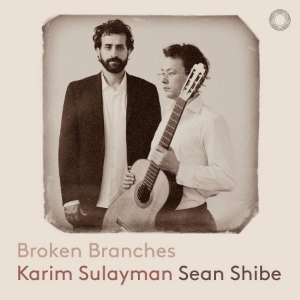
Broken Branches
Karim Sulayman (tenor)
Sean Shibe (guitar)
rec. 2022, St Martin’s Church, East Woodhay Newbury, UK
Reviewed as a digital download from a press preview
Pentatone PTC5187031 [51]
The title of this collection, Broken Branches, references a line from a poem, A Butterfly in New York by Sinan Antoon. Its theme of the experience of immigration, displacement, belonging and otherness (particularly the tension between ideas of East and West) gives the unifying thread for all the music included. It also provides the text for a song setting by Layale Chaker in the second half of the recital. Sadly, that setting is emblematic of a recording which looks intriguing on paper but falls a little short on delivering on that potential. There is nothing wrong with Chaker’s setting. It is just a little forgettable.
Likewise, there is no disputing that American Lebanese tenor, Karim Sulayman, is a decent singer but his misfortune is to be paired with a musical superstar. His singing too often remains one dimensional next to the vivid 3D of Shibe’s interludes. Too much of what he does is frankly pallid and a little fey. I imagine this is intentional but it makes the first half of this release sound very samey. Contrast his account of Dowland’s Time Stands Still with that by Emma Kirkby and the lifelessness of Sulayman’s singing becomes horribly apparent. He isn’t helped by the fact that so much of the music included is slow and melancholy. Of course, Dowland is meant to be melancholy but it should also be more passionate than this surely? Each time Shibe picks up a solo the contrast becomes more painfully obvious. Poor Sulayman!
To balance these negative comments out a little, it has to be said that the entire collection is rooted in a superlative account of Britten’s Songs from the Chinese. Sulayman reserves his finest singing for this greatly underrated cycle. Even here, in contrast to the recording by the work’s inspiration, Pears and Bream, what makes this new version so interesting is the shift in balance from singer to guitarist. No matter how well Sulayman sings, Shibe’s delicate, intricate playing draws the attention the way magnets attract iron filings. Few guitarists have possessed the charisma of Julian Bream but even he must concede the limelight to the inimitable, irresistible Peter Pears. Sensibly Sulayman doesn’t attempt the kind of Pears impersonation that was painfully common amongst the generation of tenors who followed him. He sings with intelligence and crystal clear words but, intriguingly, it is the most purely beautiful singing on the disc. It is as if he realised that in this respect at least he can get one over Pears.
As for Shibe, he not only holds his own against Bream but, to my ears goes one better. Bream’s more lute like sound is like the precise lines of an etching where Shibe gives us the evocative washes of a Chinese watercolour landscape. Shibe finds more variety and colour in Britten’s extraordinary guitar writing and is able to evoke whole vistas with the tiniest of phrases. I had remembered this work as the onset of Britten’s more austere later period but not so here. Or rather like the other masterpieces of that late period, this song cycle is revealed as far from austere in its immense subtlety and precise craftsmanship.
It has to be said that a lot of the middle of the programme I found a bit dull. I hoped for more vigour from the songs arranged from non European traditions but as in so much of the rest of the programme, Sulayman seems languid to the point of comatose. A slumbering state is probably the best one to experience the rather tacky makeover of the big slow movement tune of Rodrigo’s Concierto de Aranjuez, Li Beiriut by the Lebanese singer, Fairuz. Whilst I care even less for the arrangement in her own recording of the song, Fairuz’ at least oozes passion and deep feeling – precisely what is missing in the newer account.
As this demonstrates, mostly this isn’t an issue with repertoire: I have the same problems with the Dowland, Monteverdi and Caccini. Indeed, as I mentioned I wish some of the vitality that informs the singing of the Britten had infected the remainder of the works featured. Shibe does his best to bring some energy to the Sephardic tune, La Prima Vez, only for Sulayman to pour cold water on his enthusiasm with his multipurpose melancholy. In this mood, his voice takes on a rather pinched tone which does no favours to these wonderful melodies.
Sean Shibe has produced a remarkable sequence of recordings since Soft/Loud and if I were reviewing his contribution alone this would merit the Recommended accolade. Whilst the Britten becomes my preferred modern version and is at least as good as the old Pears Bream account, I am not sure this outweighs the longueurs of the rest of what on paper looks like a most enticing album but which delivers a pale version of that potential.
David McDade
Help us financially by purchasing from


Contents
John Dowland (1563-1626)
Time Stands Still
Jonathan Harvey (1939-2012)
Sufi Dance
Giulio Caccini (1551-1618)
Dalla porta d’oriente
Claudio Monteverdi (1567-1643)
Sì dolce è’l tormento
La mia turca
Traditional Sephardic
La prima vez (arr. Sean Shibe & Karim Sulayman)
Arab-Andalusian muwashshah
Lamma bada yatathanna (arr. Sean Shibe)
Sayed Darwish (1892-1923)
El helwa di (arr. Sean Shibe & Karim Sulayman upon Ronnie Malley’s arrangement)
Fairuz (b. 1934), after Joaquín Rodrigo (1901-1999)
Li Beirut (arr. Sean Shibe & Karim Sulayman)
Layale Chaker (b. 1990)
A Butterfly in New York
Toru Takemitsu (1930-1996)
In the Woods
I. Wainscot Pond
Benjamin Britten (1913-1976)
Songs from the Chinese


















